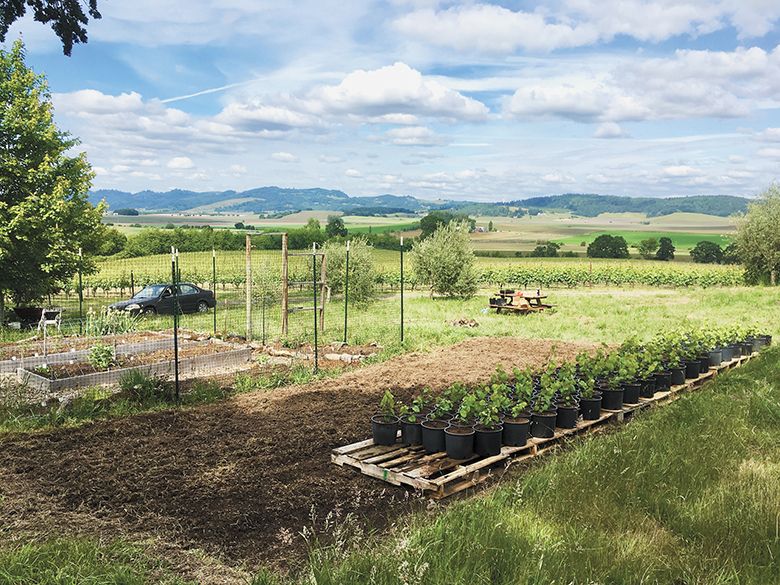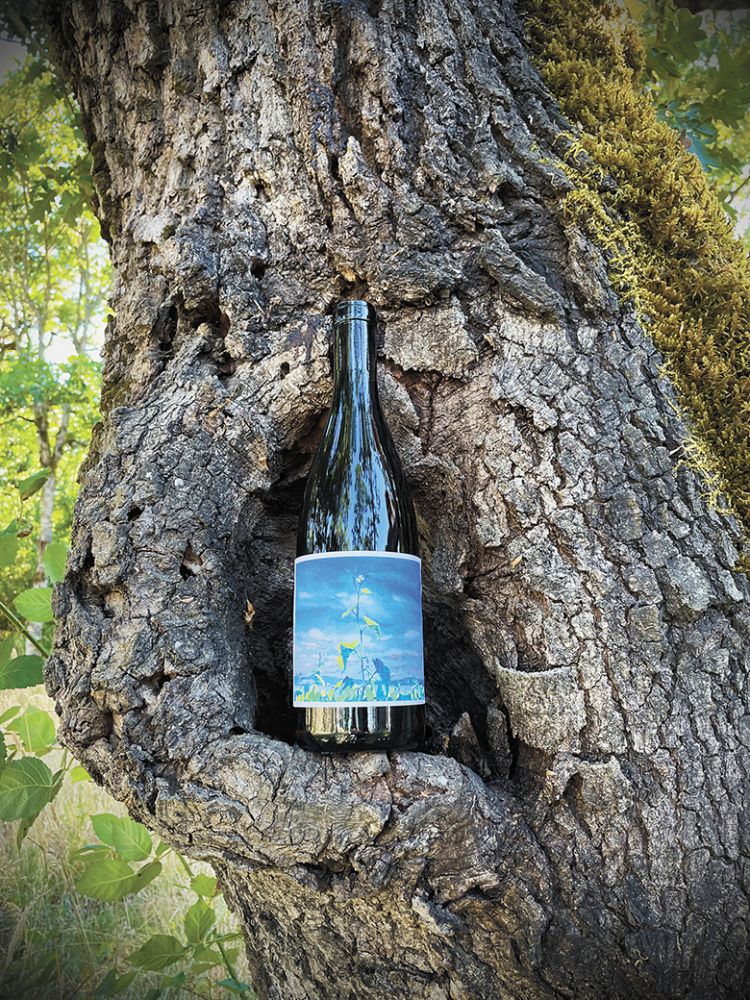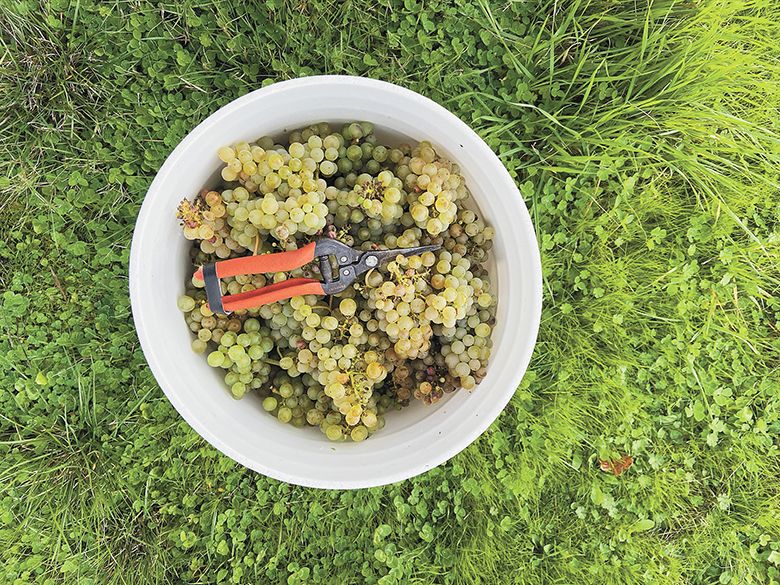Jura in for a Treat
Unique French variety flourishes in Willamette Valley



By Aakanksha Agarwal
When visiting Johan Vineyards this time of the year, notice the gorgeous glacier lilies blooming on the property, heralding the onset of the growing season. Buds swell; there’s the promise of warmth in the air and the vineyard bustles with life. But it’s not all work at Johan. You might spot their busy chickens wandering about, vineyard workers in their own right. They play a vital role, contributing to the ecosystem while circulating through the vines, laying delicious eggs and charming guests. (Next time you visit, be sure to snag a 12-pack of their farm-fresh, organic eggs.)
Nestled within the Van Duzer Corridor American Viticultural Area, Johan Vineyards embodies the biodynamic ethos, its vineyard an individual organism. Rooted in Rudolf Steiner’s principles, the winery employs homeopathic preparations and maintains a 30-acre biodiversity preserve. Calcareous soils, coastal winds and minimal intervention winemaking ensure the wines boast exquisite aromatics and unique Oregonian character. Amid these lush landscapes of Johan, a remarkable project is unfolding– Savagnin, their most exciting venture to date. Morgan Beck, the creative force behind Johan’s winemaking, shares the captivating story of reviving this unique grape, providing a glimpse into the meticulous process.
Meet Morgan Beck, winemaker extraordinaire
Winemaker Morgan Beck, with a background in finance and international business, discovered her calling in the vineyards of Oregon after stints in California, New Zealand Argentina and Chile. She candidly states, “After my first harvest experience, I fell for Pinot Noir and followed this grape around the globe.” It was a journey that eventually led her to Johan, where she embraced biodynamic practices as the foundation of her winemaking approach.
In 2015, Beck officially joined Johan, drawn not solely by the grapes but also the community, the essence of Oregon and the unique nature of the place. Beck states, “The quality of the fruit, the nature of the fermentations was totally unlike anything else. There’s something extraordinary about the place.” This unique essence became the cornerstone of Beck’s winemaking philosophy– an ongoing exploration and deeper dive into the singular site.
Crafting wines with purpose
At Johan, the journey starts with the soil itself. For 17 years, the vineyard has been a living testament to organic and biodynamic principles. The cooling influence of winds from the Pacific Ocean funneling through the Van Duzer Corridor creates an ideal climate for grape growing. Beyond biodynamics, regenerative farming takes center stage, emphasizing intentional diversity, and no-tillage since 2017. It’s not just about growing grapes, but about sustaining healthy connections between vines and the living elements of the soil.
What defines Johan is not just the excellence in grapes but a dedication to organic and biodynamic farming. “Farming is our passion and driving force,” Beck emphasizes, detailing their commitment to sustainability. Certified biodynamic since 2010, Johan creates wines that authentically translate the vineyard and each year’s unique characteristics.
Step into the vineyard and a spectacle of diversity surrounds you. Johan grows 15 varieties, a smattering of French, Austrian and Italian grapes. Pinot Noir plays a starring role, but there’s also Chardonnay, Savagnin, Gamay Noir, Cabernet Franc, Grüner Veltliner and Blaufränkisch. “Diversity is key to us. We’re Pinot Noir-focused, but love to dabble in other cool climate varieties,” Beck notes, showcasing their love for variety. They’re a Demeter-certified cellar. No acidification or chaptalization, only natural yeasts, and no tannin adjustments– each bottle a transparent expression of what the vineyard creates for a given vintage.
A thriving ecosystem is incomplete without animals– enter the flock of 30 sheep, accompanied by guardian dogs. “They are living lawnmowers,” Beck laughs, pointing out how the sheep contribute to maintaining and fertilizing when it matters the most.
As custodians of the land, Johan Vineyards believes in letting nature take the lead. Native-yeast fermentation becomes the maestro’s baton. “Minimal intervention in the cellar allows the true character of the grapes to shine through,” Beck affirms.
The Savagnin saga
Savagnin, an ancient grape with French roots, dates back 900 years. Also known as Traminer– and Heida in Switzerland– it thrives in Eastern France, producing dry white wines. Notably, it takes topping billing in the renowned ‘vin jaune’ wines of Jura, aged for over six years in oak barrels, resulting in nutty, Sherry-like richness. It has varied expressions, from citrus and floral notes to exotic, tropical flavors.
How did this unusual grape thrive in Oregon? Well, it may seem to be an unlikely location but Johan is very well known for dabbling (albeit very successfully) in uncommon varietals and continuously pushing the envelope. “Savagnin is, by far, the most exciting new project we have going on here,” Beck declares.
“The story of Savagnin is a journey that began in 2017,” Beck reflects. She enumerates the stages, from receiving the baby vines through meristem propagation, nurturing them in the garden, and the pivotal moment of harvesting budwood for grafting in the spring of 2019. She recounts the 2020 expansion of plantings, culminating in the first vintage the following year, released to the public in the fall of 2022.
What a journey it was, Beck vividly recalls, “It was like a vineyard epiphany when I realized the baby plants had reached the correct diameter for grafting. I took a picture of the shoot tip reaching for the sky on the perfect bluebird day – which became our label artwork.” This vivid moment, captured in a watercolor label, graces the bottles of Johan’s Savagnin.
“For our first vintage, I employed the standard technique we use for our Chardonnay. It’s an oxidative approach, allowing the juice to brown during a long, hard press cycle, and barrel fermenting/aging the wine in barriques for 11 months before bottling. The white wine is fermented with native yeast and bacteria found in the vineyard system and the cellar, with only a small addition of sulfur added immediately before bottling,” Beck observes, providing a glimpse into the winemaking process.
“The wine is reminiscent of our Chardonnay,” Beck continues, painting a sensory picture. “Full of salinity and a textured mid-palate, but with a touch more acidity and long finish.” It pairs exceptionally well with Pacific Northwest seafood of all kinds: succulent shrimp, salmon, scallops and oysters.
A resilient ecosystem
“We are driven by our commitment to regenerative and biodynamic farming,” she affirms. With a fully “estate” winery operation, Johan Vineyards remains distinct. Beck collaborates closely with vineyard manager Nathan Wood, making strategic farming decisions to amplify quality and convey the purest translation of the farm. “We’re trying to eventually close the loop and build fertility fully from within,” Beck emphasizes, summarizing Johan’s commitment to sustainability.
“We believe in a healthy mycorrhizal and bacterial association between our vines and the soil. It’s the key to our farming approach.”
“We like to think our diverse system is becoming more resilient,” says Beck, as she muses over the interconnection between sustainable practices and their wines. Each bottle becomes an expression of the journey and exploration of place– a testament to Johan Vineyards’ unparalleled dedication and innovative spirit.
Johan Vineyards
4285 N. Pacific Hwy., Rickreall, OR
(503) 623-8642
johanvineyards.com
AAKANKSHA AGARWAL is a wine, travel and lifestyle writer from India. Formerly a Bollywood stylist, she now resides in the U.S., embracing writing full-time while juggling family life and indulging in her passions for cuisine, literature and wanderlust.










